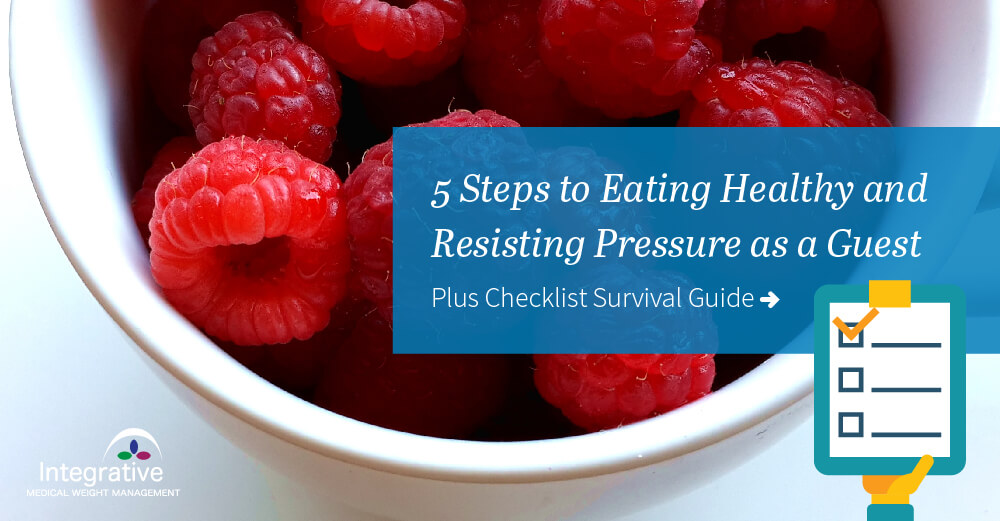Jill was afraid to discuss her new dietary needs with her family for the first time. Actually…she was terrified. Jill has struggled with her weight all her life, a fact that her family reminds her of every time she sees them. Her slender sister—a self-appointed weight loss expert—lectures Jill endlessly about what she should be doing to lose weight. Then her mother chimes in, expressing “concern” about her weight, while her dad remains silent. Jill sits there frozen, waiting for it to end. And when it does, her mother plops a carby treat on Jill’s plate and responds with hurt if she doesn’t eat it. It’s a mixed message—one that she’s been getting her whole life. And now…in just a week…she will travel with her sister to Atlanta for Thanksgiving with their parents. As she thinks about it, her brain whirls with worst-case scenarios. But after all the progress she’s made with healthy eating…and feeling in control…she doesn’t want to stop now! She asks herself, “What if I fall into bad habits again? What if I start eating carbs and can’t stop? What if I start feeling the way I used to? I don’t want that.” And neither do you. It’s definitely easier to eat what is served when visiting others. You may not want to impose. You might fear judgment or being laughed at or considered rude if you ask for healthy food options. I understand what it’s like. Shame about weight is real. You may feel stigmatized and blamed for your weight—even though it is a complex medical condition. That alone could keep you silent. There are those who simply don’t understand the complexities and what it takes to successfully manage weight. They think they have all the answers and try to squeeze you into their way of thinking. Some may poke fun at your new healthy habits, not realizing how unhelpful their comments are. You can’t seem to win! It may not be easy to speak up, but it’s worth it. I’m going to show you how to be a guest AND stick to the healthy eating habits you’ve worked so hard to develop.

Get my full 5 Steps for Eating Healthy as a Guest
Discover How to Stick to Your Healthy Diet in Someone Else’s Home
Send My Free GuidePreparation: What to do before you go
The best cure for worry about the unknown is preparation. If you are worried about how things will go when you get there, it’s time for some prep work! Being proactive is your best defense.
1. Pack your Feel Great Travel Snack Kit.
Having healthy snacks at hand will keep you well-fed no matter what…and you’ll be protected from temptations. I’ll tell you everything you need to know to feel great, eat healthy, and prevent hunger wherever you are.
2. Hit the grocery store BEFORE your final destination.
Don’t wait until after you arrive… or it won’t happen! Do it before the hustle and bustle of catching up and getting settled takes over. The warm embrace of your destination may dissolve your good intentions to do it later.
3. Stock up on protein.
Especially if you’ll be facing a kitchen full of sugar and carbs and little else! You’ll find a list of healthy snack ideas in the Feel Great Travel Snack Kit post that will keep you on track and feeling great.
4. Dig deep into your WHY.
Why are you eating healthy? Why is it important to you? What have you already accomplished to be where you are? Build a strong case for yourself in your mind, then feel the WHY in your heart and soul. It’s easy to forget in the heat of the moment if you don’t.
5. Communicate early with your hosts.
Communication is key, but don’t put it off. I’ll go deeper into the specifics of how to communicate before you arrive below…
—-
It’s easy to get caught in the idea that you need to please others by eating the carbs and junk that are served. Remember…it’s not your job to please your hosts by eating food that causes you problems. If someone’s mental health is shaken by your need to eat healthfully, eating junk won’t improve it. It’s the difference between returning home with confidence or with rekindled carb cravings, extra pounds, bad habits, guilt, and discouragement. You don’t need others to believe in what you are doing for your health in order to keep doing it! Carry on and remember your “Why.”
How to Communicate with Your Hosts
Communicating your needs is the most important, and perhaps most daunting, step you’ll face. Some hosts will be responsive to your requests and some will not. You might be surprised at how many will appreciate the opportunity to support you. But even if they don’t, you can still be in control of what you eat. Success requires a combination of making requests and being self-sufficient. I’m not suggesting that your offend your grandmother or lecture others about the “right way to eat.” But you need to be proactive. If you are passive, you could wind up…
- Losing your energy
- Feeling discouraged
- Falling back into bad habits
- Rekindling cravings that are hard to kick when you get home
It’s not worth it! So here are some tips on how to communicate with your hosts:
- Communicate early—the more lead time the better.
- Give your hosts a reminder as your arrival nears.
- Ask how you can help. Offer to bring food or share the shopping and preparation.
- Focus on solutions and provide options. Ask: “Given my specific food needs, would you prefer that I bring what I need or help with meal preparation or is there something else that I can do?”
- Communicate one-on-one, not in a group situation. They are more likely to be understanding and receptive.
- Don’t mention weight loss as the reason you have specific food needs. It might start an unnecessary debate about the merits of your eating plan. You know what works for you, that’s all that matters! If the host presses you, explain that you need to avoid foods that don’t agree with you. Enough said!
- If you have a close relationship with the host, be open about how hard you’ve worked to develop your habits and how much you need their support.
Remember that you have a medical condition that requires attention to food choices and the timing of meals. It is no different than any other health condition. If you were hosting someone with a medical condition that necessitated certain needs, you would willingly accommodate them. Others have the same capacity. Don’t let fear or shame stop you from speaking up.

Get my full 5 Steps for Eating Healthy as a Guest
Discover How to Stick to Your Healthy Diet in Someone Else’s Home
Send My Free GuideGame Time: What To Do When You Arrive
You’ve arrived. Hugging ensues. Spirits are high, and a frantic slew of events happen all at once as you get oriented. But you’re ready. So was Jill. Before the trip she let her sister and parents know that she was focused on healthy eating. They heard her conviction and offered their support. She packed her Feel Great Travel Snack Kit and stopped at the grocery store with her sister before they arrived at their parents’ home. She was still nervous about the subject coming up, but not as nervous as she would have been if she hadn’t prepared. When it did, she thanked her family for their concern and told them that she had it handled. Her mother tested her resolve by dishing her up a giant piece of pecan pie, but Jill politely said, “No, thank you.” They soon learned that she was putting her need to be healthy above the need to please others. As it turns out, Jill has a more sophisticated understanding about eating for weight management than anybody else in her family. But most importantly, she knows what works for her. She returned home with a growing confidence that she can speak up and stay focused on her health, even when the situation is challenging. Like Jill, you can be focused and powerful—and healthy—when you are a guest. And as you do, your confidence will grow. You don’t have to let fear or shame paralyze you from speaking up for your health! Most people don’t understand what you face or how important it is that you eat healthy…but you do! Just stick to your plan, remember your “Why” and follow the tips I’ve shared. And for more support and tools like this, join the newsletter »
Your Next Step
Apply this process to your next family gathering, group vacation, or dinner with friends. Leave a comment below about one thing you will do now to prepare for the next time you are a house guest, dinner guest, or party guest. And be sure to share your successes!








